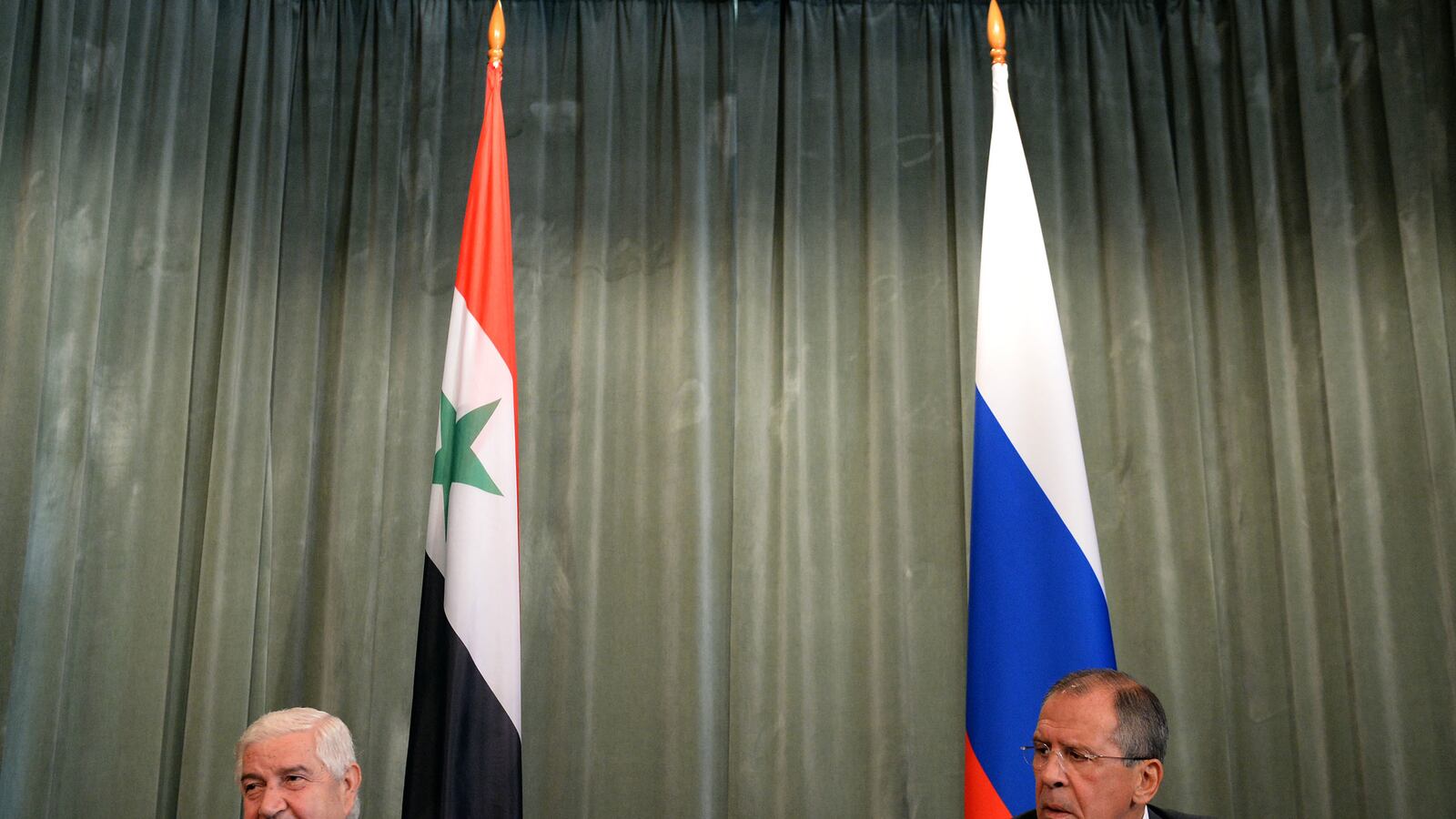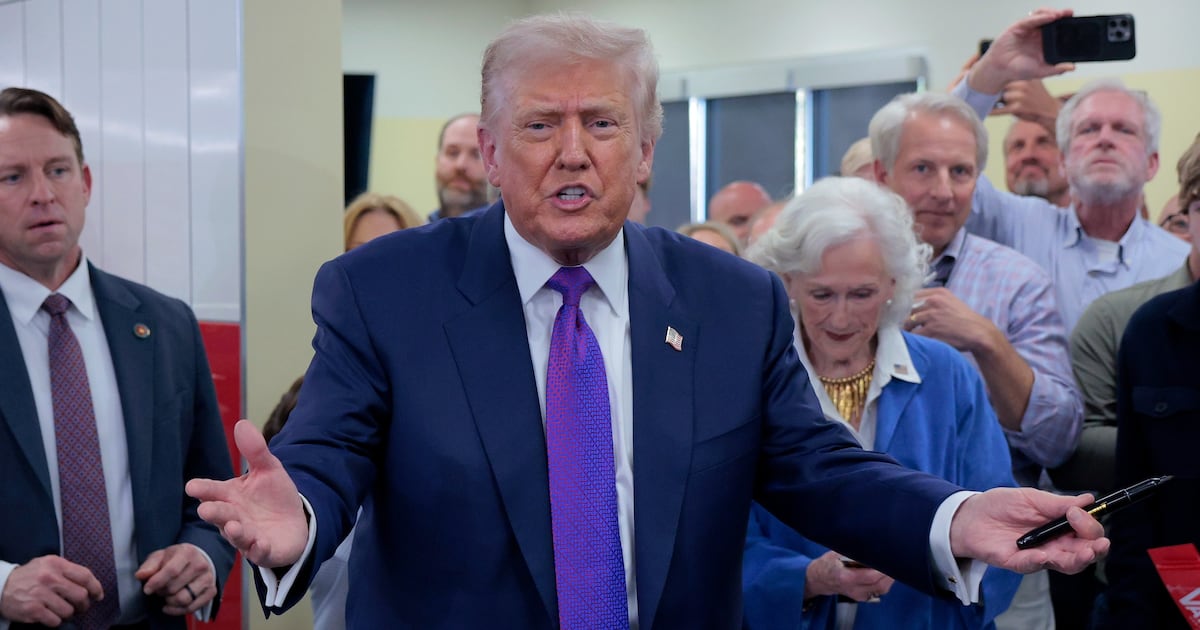From the early days of the Arab Spring, Russia has systematically backed every dictator over the revolutionary people. Tunisia’s Ali, Egypt’s Mubarak, Yemen’s Saleh, Libya’s Gaddafi, and, of course, Syria’s Assad have all enjoyed staunch support from the Kremlin, which also vigorously opposed any international military intervention.

The problem for these Middle Eastern despots was that support from Moscow didn’t actually do much good. Every man on that list, except Assad, was deposed, lynched, or imprisoned. To a historically minded observer, it seemed the Kremlin’s political and military might weighed lighter than the days of the Cuban missile crisis or the Cold War.
Until now.
Yesterday Russian Foreign Minister Sergei Lavrov brought the drive by the Obama administration toward punitive airstrikes against Syria to a juddering halt by suggesting that Assad hand over his chemical weapons stockpiles to U.N. inspectors. An off-the-cuff remark about the possibility of disarming Syria of chemical weapons by Secretary of State John Kerry was apparently unplanned but gave the Russians the diplomatic chink through which they adroitly charged. In the event, President Obama cautiously welcomed Moscow’s suggestion, calling it a “possible breakthrough” and a “potentially positive development” in the standoff with the Syrian regime.
Obama’s relief is understandable because persuading war-shy Republicans in Congress to back airstrikes was proving an uphill struggle. Kerry will doubtless try to keep up the pressure for bombing. But for the next few weeks, at the very least, the world community’s debate is likely to revolve around U.N. weapons inspection teams, access to suspected WMD sites and verification—all the rigmarole we remember from Iraq in 2002. The bottom line, seen from Damascus, is that—for the moment at least—U.S. bombs are not falling—and that’s thanks to Russia. Lavrov may not have saved Assad indefinitely. But he has certainly bought the dictator some time.
The question is why. What is in it for Russia to give succor to the world’s rogue regimes—not just the Arab dictators listed above but also Burma’s now-fallen military junta, Iran’s ayatollahs, the khans of Uzbekistan, Turkmenistan, and Kazakhstan?
Oddly enough, Putin’s strategy is both ideological and rooted in self-interest. Essentially, Russia strongly opposes any kind of international intervention in a nation’s internal affairs because Putin fears that, one day, that logic may be applied to Russia and its satellites. Russia and China are great, multiethnic empires. Both, unsurprisingly, see the post–Cold War theory of the international community’s “responsibility to protect”—known to diplomats as R2P—as a direct threat to their ability to squash internal uprisings as well as a potential excuse for the West to meddle in their affairs. Think Chechnya or Tibet.
Putin is also, for obvious reasons, not a great fan of people-power democracy movements that overthrow corrupt, thieving elites. Thanks to a powerful combination of control of Russia’s vast oil wealth, and a personal ruthlessness honed by years in the KGB, Putin has so far been able to remain in power by imprisoning opponents and flooding his grassroots with State money. More important, he’s built a “power vertical” of loyal governors, police chiefs, and an army of subordinate bureaucrats whom he’s bound to the Kremlin in an unwritten pact: they are allowed to steal with impunity but must remain utterly loyal to Putin, the capo di tutti capi.
Putin successfully stamped out a nascent protest movement in Moscow in 2011–12, but last weekend voters in Moscow and Ekaterinburg once again showed that Putin’s power base is less solid than he imagines. In Moscow, prominent anticorruption campaigner Alexei Navalny scored close to 30 percent of a mayoral vote, while in Ekaterinburg in the Urals a Kremlin-backed incumbent was ousted by a local challenger. And the Arab Spring and the so-called color revolutions that swept the former Soviet Union in the mid-2000s showed pro-democracy movements are infectious. To the Kremlin’s mind, they must be opposed wherever they occur.
Then there’s the question of respect on the international stage. Putin’s spinmeisters cast him as the man who made Russia a great power again. (He probably believes it himself—despite a slowing growth rate and a price collapse in Russia’s most valuable export, natural gas.) And one of the things the leaders of great powers do is stand up to the United States. For many years Russia opposed U.S. sanctions against Iran (last year’s great threat to global peace)—even though a nuclear-armed Iran is every bit as much a threat to Russia and its allies in the Caucasus as it is to the U.S. and Israel. The Soviet Union was Washington’s great historical sparring partner; Putin is doing his best to make it so again. Whether the U.S., with bigger global fish to fry, is interested in playing Putin’s new Cold War game is doubtful.
For the moment, Russia has offered Obama a convenient way out of a political impasse with its offer to broker a chemical disarming of the Assad regime. Long term, though, Russia shows no signs of letting up on its dogged support—both diplomatic and military—of tyranny from Syria to Iran. That is Russia’s sovereign right, of course, but it puts Washington and Moscow once again on opposite sides of history.






